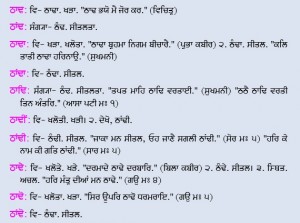ਠਾਢਾ (Thaada) vs ਠਾਂਢਾ (Thaanda)
I’d like to share something I just recently learned about the Gurbani Ucharan (pronunciation) of a specific word. I’ve heard this mistake in a lot of paath recordings and I made the same mistake myself for years. The word ਠਾਢਾ (and its variations) appear in Sri Guru Granth Sahib Ji many times, but we often confuse it with ਠਾਂਢਾ – which also appears in Gurbani, but not nearly as much as ਠਾਢਾ . So, what is the difference?
ਠਾਢਾ is pronounced ” taada” (with the t making the same sound as in talk”and d making the same sound as in dog.)
ਠਾਂਢਾ is the same but it has a bindi, which makes its pronunciation “taanda” – with a nasal sound.
The common mistake is to pronounce ਠਾਢਾ with a nasal sound, as if it had a bindi. This is probably because we’re more familiar with the word thandaa ( meaning cold) from Punjabi. Sadly, we usually don’t know the meanings of the baani we read, so we may not actually be aware of when to pronounce a word with a bindi and when not to. Sometimes we just stick it wherever it sounds right. And if 1 person does it wrong, everyone who listens to him or learns from him could also start doing it wrong, and the mistake gets passed on. The difference in pronunciation represents a difference in meaning.
ਠਾਢਾ means standing, to stand, still etc..
whereas
ਠਾਂਢਾ means cold, cool, soothing, peace etc.. as in:
ਹਰਿ ਕੇ ਨਾਮ ਕੀ ਗਤਿ ਠਾਂਢੀ ||
har kae naam kee gath t(h)aa(n)dtee ||
The Name of the Lord is cooling and soothing.
Switching the two words can totally change the meaning of the line being read. It should be easy for us to be aware of the difference because ਠਾਂਢਾ usually appears with a bindi when it means cool, and without when it means to stand. Sukhmani Sahib written by Guru Arjun Dev Ji contains both words:
ਕਲਿ ਤਾਤੀ ਠਾਂਢਾ ਹਰਿ ਨਾਉ ||
kal thaathee t(h)aandaa har naao ||
The Dark Age of Kali Yuga is so hot; the Lord’s Name is soothing and cool.
ਸਿਰ ਊਪਰਿ ਠਾਢਾ ਗੁਰੁ ਸੂਰਾ ||
sir oopar t(h)aadaa gur sooraa ||
The Brave and Powerful Guru stands over his head.
Another variation is ਠਾਢਿ, with a siharee, which appears both with and without a bindee.
ਤਪਤਿ ਮਾਹਿ ਠਾਢਿ ਵਰਤਾਈ ||
thapath maahi t(h)aadt varathaaee ||
In the burning heat, a soothing coolness prevails.
In this case one should pronounce it with a bindi, because it is being used to mean “cool/sooth”. Usually the context can help tell the meaning. If there is a word such as ਤਾਪੁ, or ਤਪਤਿ, meaning heat/burning/fever, then thaand is referring to cool.
Here are some other lines where this mistake is commonly made:
Bhagat Kabir Ji (Aarti):
ਠਾਢਾ ਬ੍ਰਹਮਾ ਨਿਗਮ ਬੀਚਾਰੈ ਅਲਖੁ ਨ ਲਖਿਆ ਜਾਈ ||੧|| ਰਹਾਉ ||
t(h)aadaa brehamaa nigam beechaarai alakh na lakhiaa jaaee ||1|| rehaao ||
Standing at His Door, Brahma studies the Vedas, but he cannot see the Unseen Lord. ||1||Pause||
Bhagat Kabir Ji:
ਦਰਮਾਦੇ ਠਾਢੇ ਦਰਬਾਰਿ ||
dharamaadhae t(h)aadae darbaar ||
I stand humbly at Your Court.
Guru Raam Daas Ji:
ਮੰਗਤ ਜਨ ਦੀਨ ਖਰੇ ਦਰਿ ਠਾਢੇ ਅਤਿ ਤਰਸਨ ਕਉ ਦਾਨੁ ਦੀਜੈ ||
ma(n)gath jan deen kharae dar t(h)aadae ath tharasan ko daan deejai ||
The meek and humble beggars stand begging at Your Door. Please be generous and give to those who are yearning.
Guru Gobind Singh Ji (Dasam Granth Sahib):
ਠਾਢ ਭਯੋ ਮੈ ਜੋਰਿ ਕਰ ਬਚਨ ਕਹਾ ਸਿਰ ਨਿਆਇ ||
t(h)aad bhayo mai jor kar bachan kehaa sir niaae ||
I stood up with folded hands and bowing down my head, I said,
ਪੰਥ ਚਲੈ ਤਬ ਜਗਤ ਮੈ ਜਬ ਤੁਮ ਕਰਹੁ ਸਹਾਇ || ੩੦||
pa(n)thh chalai thab jagath mai jab thum karahu sahaae
“The Panth (the religious order of righteousness) will be established provided You support me.”
In the above shabads, the word is thaada – meaning stand, and should be pronounced without a bindi, just as it is written. If we make an active effort to understand the meanings of Gurbani, hopefully we can avoid other mistakes like this. As always, I appreciate any input/comments/discussion.
Bhul Chuk Muaf
Posted in Sikhi and tagged baanee, baani, gurbani, gurmat, pronounciation, punjabi, veechar, vicharwith 4 comments.
